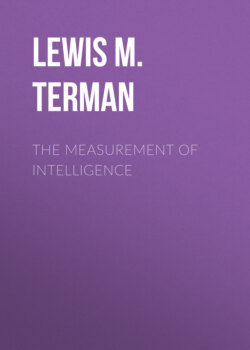Читать книгу The Measurement of Intelligence - Lewis M. Terman - Страница 32
На сайте Литреса книга снята с продажи.
3. Binet would test “general intelligence.”
ОглавлениеFinally, Binet’s success was largely due to his abandonment of the older “faculty psychology” which, far from being defunct, had really given direction to most of the earlier work with mental tests. Where others had attempted to measure memory attention, sense discrimination, etc., as separate faculties or functions, Binet undertook to ascertain the general level of intelligence. Others had thought the task easier of accomplishment by measuring each division or aspect of intelligence separately, and summating the results. Binet, too, began in this way, and it was only after years of experimentation by the usual methods that he finally broke away from them and undertook, so to speak, to triangulate the height of his tower without first getting the dimensions of the individual stones which made it up.
The assumption that it is easier to measure a part, or one aspect, of intelligence than all of it, is fallacious in that the parts are not separate parts and cannot be separated by any refinement of experiment. They are interwoven and intertwined. Each ramifies everywhere and appears in all other functions. The analogy of the stones of the tower does not really apply. Memory, for example, cannot be tested separately from attention, or sense-discrimination separately from the associative processes. After many vain attempts to disentangle the various intellective functions, Binet decided to test their combined functional capacity without any pretense of measuring the exact contribution of each to the total product. It is hardly too much to say that intelligence tests have been successful just to the extent to which they have been guided by this aim.
Memory, attention, imagination, etc., are terms of “structural psychology.” Binet’s psychology is dynamic. He conceives intelligence as the sum total of those thought processes which consist in mental adaptation. This adaptation is not explicable in terms of the old mental “faculties.” No one of these can explain a single thought process, for such process always involves the participation of many functions whose separate rôles are impossible to distinguish accurately. Instead of measuring the intensity of various mental states (psycho-physics), it is more enlightening to measure their combined effect on adaptation. Using a biological comparison, Binet says the old “faculties” correspond to the separate tissues of an animal or plant, while his own “scheme of thought” corresponds to the functioning organ itself. For Binet, psychology is the science of behavior.
